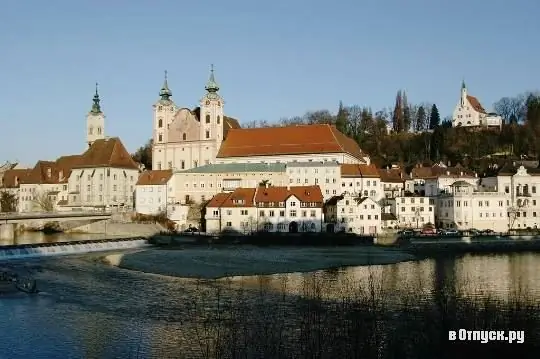
Description of the attraction
Steyr is a city located in the Austrian federal state of Upper Austria at the confluence of the Steyr and Enns rivers. Steyr is the third largest city in Upper Austria, located at an altitude of 310 meters above sea level. Steyr is located in the foothills, due to the difficult terrain with a lot of water and hills, the average annual air temperature is only 10 ° C.
The first documented mention of Steyr dates back to 980, when the entire surrounding area was owned by the Traungau family. In 1186, Steyr, part of the Styrian lands, passed to the Dukes of Babenberg, and later to the Habsburg family. Steyr received city rights by order of Albrecht I in 1287. Since 1260, the courts of the Inquisition have been held in the city. The most serious persecutions took place from 1391 to 1398 under the leadership of Inquisitor Peter Zwicker. In 1397, 80 to 100 people were burnt in the cemetery of heretics.
The city's rapid flourishing in the 14th century stimulated an influx of artisans, mainly from Nuremberg. In 1525, Martin Luther visited Steyr, after which the city became one of the main centers of the Reformation.
On August 29, 1727, Steyr was ravaged by a devastating fire that destroyed most of the old city.
During the Second World War, several factories for the production of military equipment functioned in the city, for this reason Steyr was repeatedly bombed by the Allies. After the end of the war, like Berlin, Steyr was divided between Soviet and American troops. Only in 1955 the city was completely liberated.
Steyr celebrated its 1000th anniversary in 1980, after undergoing extensive restoration work on historic architecture, making it one of the best-preserved old cities in Austria. Steyr is famous for its historic center, built around the Town Square. The Rococo town hall with an elegant spire was built by Johann Geiberger. The parish church was erected in 1443 and later rebuilt in the neo-Gothic style. Of particular interest are stained glass windows and decorative elements from the 15th century. And the former cemetery church of St. Margaret in 1430. The castle, located in the Old Town, was first documented in the 10th century. After many reconstructions, the exterior of the building is now in the Baroque style, and the interior is in Rococo.
Steyr is currently a member of the Small Historic Towns Association, which makes it attractive to tourists.






